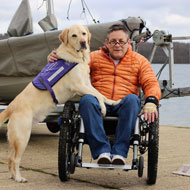Wheelchair user’s trek to help assistance dog charity

Tim aims to raise £20,000 by doing the challenge in a ‘mountain trike’ wheelchair.
A wheelchair user is set to take on one of the world’s most famous pilgrimage routes to raise money for assistance dog charity, Canine Partners.
Timothy Scott is taking on the Camino de Santiago in September 2020, a 500-mile trek from St Jean Pied de Port in south-west France to Santiago de Compostela in north-west Spain.
Tim said: “It’s a way that I can give something back to the charities that have helped me, one being Canine Partners, who have given me my assistance dog Elliott.”
In 2009, Tim was rendered tetraplegic after being involved in a motorcycle accident. Having previously been sporty and a self-confessed ‘workaholic’, he was suddenly stuck at home doing nothing and sank into a deep depression.
But this all changed in June 2015 when he was partnered with his canine partner, Elliott. Canine partners help their owners with tasks around the home, such as fetching items, opening doors and seeking help in an emergency.
“Life after getting my canine partner Elliott was different because all of a sudden I’ve got someone to care for instead of being the person who is cared for or looked after and he’s given me back my independence,” says Tim. “I can’t even begin to imagine what it would be like without Elliott, he is one of the family.”
Tim aims to raise £20,000 by doing the challenge in a ‘mountain trike’ wheelchair. This is how much a canine partner costs from selection as a puppy to retirement at 10 years old.
“I want to be able to let someone else benefit from what I have through Canine Partners,” says Tim. “I think when I come to next year and it starts getting closer to the time, it’s going to be hard.
“It’s in my own hands. If I don’t push myself and I don’t train, then I will struggle. It’s up to me and within my own destiny to be able to make it work.”
If you would like to sponsor Tim please visit www.tim-elliott-camino.rocks or uk.virginmoneygiving.com/tim-elliott-camino.rocks



 The latest
The latest